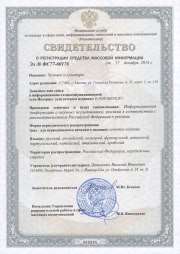|
MAIN PAGE
> Back to contents
Publications of Semukhina Elena Aleksandrovna
|
Philosophy and Culture, 2024-4
|
|
Semukhina E.A., Shindel S.V. - Culture and Morality in the Nineteenth Century: The Origins of Modern European Tolerance
|
|
pp. 96-104
|
DOI: 10.7256/2454-0757.2022.5.37666
Abstract: This publication aims to analyze the economic, social, and cultural phenomena that first appeared in the "era of revolutions" that occurred in the nineteenth to early twentieth centuries. The modern European trend toward tolerance, which is the basis of current social and cultural changes, including in our country, has specific intellectual grounds. The subject of the study was the ideosphere of the nineteenth and early twentieth centuries, including philosophical, economic, and psychological concepts that gave rise to modern trends in these areas. The result of this study was the determination of the reasons that caused the change of the ideological paradigm in Europe. The novelty of the research lies in the fact that, for the first time, the intellectual foundations of the formation of tolerance as an actual socio-cultural phenomenon are analyzed. This article consistently proves that among the first such grounds, it is possible to determine the emergence of machine production and, as a result, the appearance of a mass person with a culture corresponding to them, performing a compensatory and entertaining function. The most important cultural foundation is mainly the intellectual "background" created by the teachings of Friedrich Nietzsche, Karl Marx, and Sigmund Freud. The ideas of Anglo-American pragmatism played a significant role in forming a new morality, which included the denial of religion and its values, giving it a utilitarian character. During the subsequent historical period and at present, these views have become the basis for the creation of the so-called "individual faith," in which religion ceases to be the guide of human life but only serves the needs of the individual. The desacralization of religion leads to the study of different aspects of sexuality, which opens up the possibility for modern thinking about gender. The concept of "natural law" should also be attributed to the intellectual factors of the formation of modern European tolerance.

|
Philosophy and Culture, 2024-3
|
|
Semukhina E.A., Shindel S.V. - On the media representation of the universal category of culture "sinfulness"
|
|
pp. 75-81
|
DOI: 10.7256/2454-0757.2022.2.37598
Abstract: This article aims to analyze the manifestation of the universal axiological cultural category of sinfulness in the media space. The study's subject was this category's properties and functions, which are actualized when represented in digital media. In accordance with this goal, we used such methods as continuous sampling and observation of the facts of the representation of cultural categories, which allowed us to determine the linguistic material for analysis and a statistical method for quantitative analysis. The content analysis of the units selected for the study was used to identify the role, properties, and main functions of the universal axiological category of sinfulness. The novelty of the research lies in the fact that, for the first time, the universal nature of the category of sinfulness, its functions and properties, represented in media publications, were considered. Main conclusions: the study of the facts of actualization of the category of sinfulness in the media space allowed us to assert that the phenomenon under study is associated with topics such as politics, crime (in news media), and the assessment of citizens' behavior and morality (in religious media). These facts indicate that the primary function of the category of sinfulness is regulatory, aimed at evaluating and correcting the actions of members of society, as well as creating public opinion. In addition, the article proves that the category of sinfulness has transcultural properties, penetrating and being realized in all cultural layers, from local to global. In these cultural layers, the nature of the category acquires a different shade. In particular, at the global level, the category of sinfulness acquires the meaning of guilt, which is a consequence of the significant influence of Western culture on the global culture. It seems that the revealed properties of the category indicate its high importance for modern Russian society. The established regulatory function will make it possible to apply this category, including within the framework of regulating and managing public opinion and promoting basic values.

|
Philosophy and Culture, 2023-5
|
|
Semukhina E.A. - Analysis of the First Positivists’ (A. Comte, H. Spencer) Views of Mankind’s Moral Development
|
|
pp. 98-107
|
DOI: 10.7256/2454-0757.2023.5.40818
Abstract: The research subject in the present article is A. Comte’s and H. Spencer’s beliefs, who are considered the representatives of early positivism. The particular emphasis is made on the ethnicity issues. A. Comte distinguished three stages of the human consciousness elevating: theological or fictitious, metaphysic or abstract, positive or real. The scientist claimed the quality of a society as a whole is directly related to the level of the individual development. Moreover, moral ideas, which have to be free from theology and metaphysics and based on the new philosophy of positive thinking, have a powerful influence on the society development. As a result, moral principles have to be guided by social solidarity and be a society’s logical controller. However, the societal progress rejected the scientist’s notion. According to H. Spencer, social morality arises from natural one whereby altruism and social equity are built on the concern of the kind preservation. The higher the society is organized, the greater the level of the equity is. The researcher provides the example illustrating an ideal society in which a well-functioning organ evolves better than others which in turn means “social equity” principle is implemented. The scientific novelty of the article is determined by the first comparative analysis of A. Comte’s and H. Spencer’s moral-ethnical concepts as well as defining the most controversial theses in their theories. There has been found out that the key difference in the philosophers’ ideas is their seeing into the real nature of morality, having its ground either in the human mind (Comte) or natural environment (Spencer). The definition of the society as an entity with its characteristics resembling a biological organism is considered to be significantly similar in their views. Secondly discovered similarity is the definition of the human history as a progressive process in which individual human mind, morality and a society as an entity are evolving simultaneously. The present paper also puts forward the conclusion that the ideas about the history as a progressive process resulted at a “positive” stage turned out to be the most debatable issues.

|
Philosophy and Culture, 2023-4
|
|
Semukhina E.A., Voloshinov A.V., Kiryushkina V.V. - Culturological Analysis of F. R. Chateaubriand's Book "The Genius of Christianity": Success Factors and the Cultural Category of Sinfulness
|
|
pp. 196-204
|
DOI: 10.7256/2454-0757.2023.4.40388
Abstract: The historical factors as well as the units of the cultural knowledge which are considered to have provided Chateaubriand’s books, and “The Genius of Christianity” in particular, with the success and the content are the subject of the present article. The following historical reasons which attracted the readers’ attention to the book have been defined: the disappointment of the society with the atheistic ideals of the revolution, the need for religious cult restoring, the authorities’ desire to stop strife in the country and build relationships with Catholic Europe. The semantic content of the work also contributed to its popularity because it responded to the request of finding logic in the religion, had an emotional impact and dealt with the relevant issues of the morality by means of the cultural category of sinfulness. Scientific novelty of the research implies the following: the cultural category of sinfulness objectified in F.R. Chateaubriand’s book “The Genius of Christianity” having been analyzed for the first time as well as the author’s approach to the understanding and cultural information streamlining having been identified. More over cultural-historical factors promoting the book’s prominence among Chateaubriand’s contemporaries have been studied. The author’s using rational way while explaining the basis of the sin, resorting to the strict argumentation and the evidence-based methods, denying religious irrationality have been set. The conducted research has shown the key factors leading to the book’s relevance: the society’s necessity of the religion revival, the authorities’ support of this tendency specified by the political environment.

|
Philosophy and Culture, 2022-5
|
|
Voloshinov A.V., Semukhina E.A., Shindel S.V. - Culture and Morality in the Nineteenth Century: The Origins of Modern European Tolerance
|
|
pp. 12-21
|
DOI: 10.7256/2454-0757.2022.5.37666
Abstract: This publication aims to analyze the economic, social, and cultural phenomena that first appeared in the "era of revolutions" that occurred in the nineteenth to early twentieth centuries. The modern European trend toward tolerance, which is the basis of current social and cultural changes, including in our country, has specific intellectual grounds. The subject of the study was the ideosphere of the nineteenth and early twentieth centuries, including philosophical, economic, and psychological concepts that gave rise to modern trends in these areas. The result of this study was the determination of the reasons that caused the change of the ideological paradigm in Europe. The novelty of the research lies in the fact that, for the first time, the intellectual foundations of the formation of tolerance as an actual socio-cultural phenomenon are analyzed. This article consistently proves that among the first such grounds, it is possible to determine the emergence of machine production and, as a result, the appearance of a mass person with a culture corresponding to them, performing a compensatory and entertaining function. The most important cultural foundation is mainly the intellectual "background" created by the teachings of Friedrich Nietzsche, Karl Marx, and Sigmund Freud. The ideas of Anglo-American pragmatism played a significant role in forming a new morality, which included the denial of religion and its values, giving it a utilitarian character. During the subsequent historical period and at present, these views have become the basis for the creation of the so-called "individual faith," in which religion ceases to be the guide of human life but only serves the needs of the individual. The desacralization of religion leads to the study of different aspects of sexuality, which opens up the possibility for modern thinking about gender. The concept of "natural law" should also be attributed to the intellectual factors of the formation of modern European tolerance.

|
Philosophy and Culture, 2022-2
|
|
Semukhina E.A., Shindel S.V. - About the Functions and Properties of the Universal Categories of Culture and "Sinfulness" Represented in the Media
|
|
pp. 73-82
|
DOI: 10.7256/2454-0757.2022.2.37598
Abstract: This article aims to analyze the manifestation of the universal axiological cultural category of sinfulness in the media space. The study's subject was this category's properties and functions, which are actualized when represented in digital media. In accordance with this goal, we used such methods as continuous sampling and observation of the facts of the representation of cultural categories, which allowed us to determine the linguistic material for analysis and a statistical method for quantitative analysis. The content analysis of the units selected for the study was used to identify the role, properties, and main functions of the universal axiological category of sinfulness. The novelty of the research lies in the fact that, for the first time, the universal nature of the category of sinfulness, its functions and properties, represented in media publications, were considered. Main conclusions: the study of the facts of actualization of the category of sinfulness in the media space allowed us to assert that the phenomenon under study is associated with topics such as politics, crime (in news media), and the assessment of citizens' behavior and morality (in religious media). These facts indicate that the primary function of the category of sinfulness is regulatory, aimed at evaluating and correcting the actions of members of society, as well as creating public opinion. In addition, the article proves that the category of sinfulness has transcultural properties, penetrating and being realized in all cultural layers, from local to global. In these cultural layers, the nature of the category acquires a different shade. In particular, at the global level, the category of sinfulness acquires the meaning of guilt, which is a consequence of the significant influence of Western culture on the global culture. It seems that the revealed properties of the category indicate its high importance for modern Russian society. The established regulatory function will make it possible to apply this category, including within the framework of regulating and managing public opinion and promoting basic values.

|
Semukhina E.A., Shindel S.V. - Frame approach towards studying cultural phenomena
|
|
pp. 20-27
|
DOI: 10.7256/2454-0625.2021.8.36280
Abstract: The object of this research is the religious sphere, apprehended as a fragment of the cultural worldview. The unit, which allows conducting the analysis and studying the structure of cultural worldview alongside other, is the frame of cultural phenomenon. Cultural invariants are referred to as basic frames. The subject of this research is one of the major cultural phenomena, the basic frame of the Christian culture – “sin”. The author focuses on the structure of cultural phenomenon, analyzing its levels, vertex nodes (slots) and optional nodes (terminal slots). The key research method is the frame analysis. The commonly used in sociological, linguistic, and cognitive research frame analysis is a universal tool, effective and adequate to the goals and tasks of culturology. The novelty of this study is define by the lack of works on the frame analysis of cultural phenomena in the context of its relevance for the scientific community. This article is a contribution to the discussion that has unfolded in recent years on the capabilities of frame analysis in culturology. The conducted analysis demonstrates that the frame correlated with the concept of sin has a multi-level structure. The main attributes of the frame are the slots or vertex nodes – quality inherent to human, grounds for punishment, enemy, evil, evil spirit, illness, mistake, and misfortune. The terminal (optional) slots include the atoning sacrifice and forgiveness.

|
|






